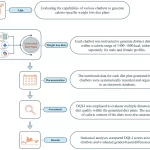After the holidays, many of us face an all-too-familiar challenge: sugar cravings. You’ve packed away the leftover candy canes, cleared up the cookie crumbs, and made a vow to not finish that box of chocolates you received. Yet, despite your best efforts, the desire for sweets lingers. Why does this happen—and how can we overcome it?
Janice Maras, a registered dietitian and the director of the Dietary Assessment Center at Northeastern University’s Bouve College of Health Sciences, explains why sugar cravings can be so persistent after a season of indulgence. In a recent interview, Maras shared insights into the effects of sugar on our brain and body, and offered practical tips for curbing those cravings.
The Science Behind Sugar Cravings
While sugar itself isn’t inherently harmful, excessive consumption—especially from processed foods, sugary drinks, and sweets—can lead to a host of health problems. These include weight gain, insulin resistance, fatty liver, and chronic diseases such as type 2 diabetes and heart disease. Mentally, sugar can contribute to brain fog, reduce cognitive function, and cause mood fluctuations, making it more difficult to focus and maintain mental clarity.
According to Maras, sugar stimulates the brain’s reward system, creating a feedback loop that makes you crave more. The cold, dark months of winter, coupled with the stress of the holidays, can further amplify these cravings for sugary comfort foods. Factors like reduced protein intake and lower vitamin D levels during this time can also increase the likelihood of sugar cravings.
Alcoholic beverages such as wine and cocktails, often rich in sugar, can exacerbate the desire for sweet treats during the holidays, making it even harder to break the cycle afterward.
How Much Sugar Should You Be Eating?
The American Heart Association recommends limiting added sugars to six teaspoons per day for women and nine teaspoons per day for men. However, Maras advises that most people consume far more than this, particularly during the festive season. The key is to gradually reduce sugar intake to manageable levels that prevent blood sugar spikes and help reduce cravings.
Should You Go Cold Turkey or Gradually Reduce Sugar?
When it comes to cutting down on sugar, Maras believes the approach should be personalized. While some individuals may be able to quit sugar cold turkey, others may find it easier to gradually reduce their consumption over weeks or even months. The goal is to find a balance that works for you and doesn’t lead to energy crashes or increased cravings.
Healthier Sugar Substitutes
For those seeking to satisfy their sweet tooth in a healthier way, Maras suggests several alternatives:
- Stevia: A plant-based, zero-calorie sweetener perfect for drinks like hot chocolate.
- Monk Fruit: 150 to 200 times sweeter than sugar with no calories—ideal for baking.
- Whole Fruits: Berries, apples, and other fruits offer natural sweetness and fiber.
- Unsweetened Applesauce or Mashed Bananas: Great for baking or making homemade protein bars.
- Dried Fruits: Prunes, apricots, and raisins provide both sweetness and fiber—just watch portion sizes.
- Sugar Alcohols: Erythritol and xylitol are low-calorie alternatives but may cause digestive issues in some people.
- Kombucha or Sparkling Waters: A refreshing alternative to sugary sodas.
Watch Out for Hidden Sugars
Even products that seem healthy can contain hidden sugars. Maras points out several common offenders, including pre-made smoothies, granola and energy bars, and even “high-protein” yogurt varieties, all of which can contain significant amounts of added sugar. Low-fat or fat-free products often contain added sugars to enhance flavor, and some flavored waters and kombucha beverages can be high in sugar as well.
To avoid these hidden sugars, Maras advises consumers to always check the “added sugars” section on product labels. Just because a food or drink appears healthy doesn’t mean it’s free of excessive sugars.
Conclusion
Sugar cravings may be tough to beat, but by understanding how sugar affects our bodies and brains, we can take steps to regain control. Whether you decide to reduce sugar gradually or opt for healthier substitutes, there are plenty of ways to satisfy your sweet tooth without going overboard. By being mindful of what you’re consuming and making informed choices, you can start the new year on a healthier note—free from the clutches of holiday sugar indulgence.
Article provided by Northeastern University











